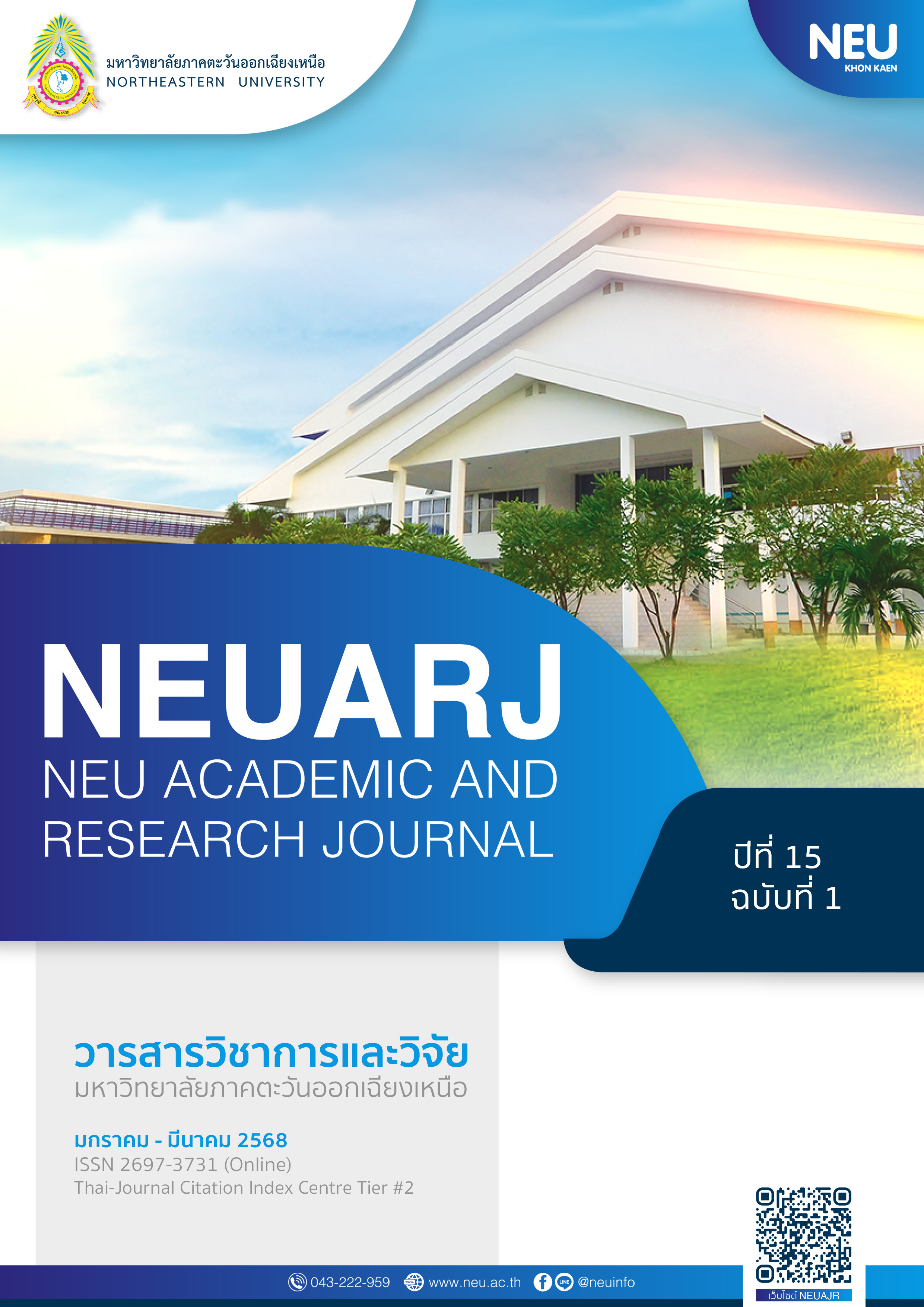Mindset and Misconception about Algebra and Geometry of Grade 9 Students
Keywords:
Mindset, Misconception about Algebra and GeometryAbstract
The objectives of this research were (1) to study the mindset and mathematical misconception related to geometry and arithmetic, (2) to compare misconception in mathematics regarding algebra and geometry, categorized by mindset and (3) to study approaches to develop mindset and mathematical misconception. The sample group comprised 43 of grade 9 students from Sarakham Pittayakom School in academic year 2023. Research tools included tests on mathematical misconception, mindset observation forms, interviews. Data were analyzed using percentages, averages, and standard deviations, task analysis and analytic description.
The research findings revealed that (1) students were mostly at the mixed mindset level, and the analysis showed that students had the highest level of misconception regarding error techniques. (2) The group with an expanding mindset had the highest level of misconception regarding error techniques. The mixed mindset group had the highest level of misconception regarding error in techniques, and the limited mindset group had the highest level of misconception regarding not knowing how to solve problems. (3) Guidelines for development of mindset were as follows: Teachers should appropriately commend students by valuing the process and effort in learning to create a learning environment that promoted the development of expanding mindset. For guidelines for solving problem on mathematical misconception, teachers should foster students' understanding of problem-solving process. Therefore, this approach could be effective in developing students' mindset and reducing misconception.
References
กระทรวงศึกษาธิการ. (2560). สาระและมาตรฐานการเรียนรู้กลุ่มสาระการเรียนรู้คณิตศาสตร์ (ฉบับปรับปรุง พ.ศ.2560) ตามหลักสูตรแกนกลางการศึกษาขั้นพื้นฐาน พุทธศักราช 2551 (พิมพ์ครั้งที่ 1). ชุมนุมสหกรณ์การเกษตรแห่งประเทศไทย จำกัด.
จุฬาลักษณ์ ทิพวัน. (2562). การพัฒนาตัวบ่งชี้กรอบความคิดแบบเติบโต สำหรับนักเรียนชั้นประถมศึกษา ปีที่ 6. [วิทยานิพนธ์ปริญญาครุศาสตรมหาบัณฑิต]. มหาวิทยาลัยมหาสารคาม.
วันชัย แก้วประเสริฐ. (2565). การศึกษาระดับการให้เหตุผลและมโนทัศน์ที่คลาดเคลื่อนทางคณิตศาสตร์ เรื่อง พื้นที่ผิวและปริมาตร ของนักเรียนชั้นมัธยมศึกษาปีที่ 3 โรงเรียนกาฬสินธุ์ พิทยาสรรพ์. [วิทยานิพนธ์ ปริญญาครุศาสตรมหาบัณฑิต]. มหาวิทยาลัยราชภัฏมหาสารคาม.
ศูนย์จิตวิทยาการศึกษา. (2558). Mindset กรอบความคิด. ศูนย์จิตวิทยาการศึกษา มูลนิธิยุวสถิรคุณ.
อัมพร ม้าคนอง. (2553). ทักษะและกระบวนการทางคณิตศาสตร์: การพัฒนาเพื่อพัฒนาการ. จุฬาลงกรณ์มหาวิทยาลัย.
อัมพร ม้าคนอง. (2557). คณิตศาสตร์สำหรับครูมัธยม. จุฬาลงกรณ์มหาวิทยาลัย.
Alerson, L. (2017). Growth Mindset: The Door to Achieving More. https://www.free- ebooks.net/ebook/Growth-Mindset-The-Door-to-Achieving-More/pdf?dl&preview.
Asquith, P., Stephens, A., Knuth, E., & Alibali, M. (2007). Middle school teachers understanding of core algebraic concepts: Equal sign and variable. Mathematical Thinking and Learning, 9(3), 249-272.
Biber, C. (2013). The mistakes and the misconceptions of the eight grade students about angles. Kastamonu University, Educational Faculty, Mathematics Education, Kastamonu, Turkey.
Chaudhary, N. (2022). Students’ Errors in Learning Algebra at Basic Level. University Campus, Kantipur, Tribhuvan University, Kathmandu, Nepal.
Colgan, M. (1991). An analysis of problem-solving errors made throughout a college level finite mathematics course. Doctoral Dissertation, Indiana University.
D'alessandro, M. (2016). The preparedness of teachers to implement a growth mindset in a secondary classroom setting. Proquest LLC. UMI 10103318
Drews, D., Dudgeon J., Hansen, A., Lawton, F., and Surtees, L. (2005). Children’s errors in mathematics: understanding common misconception in primary schools. Learning Matters.
Dweck, C. S. (2006). Mindset: The new psychology of success. Random House.
Kembitzky, K. A. (2009). Addressing Misconceptions in Geometry through Written Error Analyses. The Ohio State University.
Mathaba, P. N. (2019). Learner errors and misconceptions in ratio and proportion: a case study of grade 9 learners from a rural KwaZulu-Natal school. University of Zululand.
Movshovitz-Hadar, N., Zaslavsky, O., & Inbar, S. (1987). An empirical classification model for errors in high school mathematics. Research in Mathematics Education, 18(1), 3-14.
Ndlovu, M., & Mji, A. (2012). Alignment between South African mathematics assessment standards and the TIMSS assessment frameworks. African Journal of Research in Mathematics, Science and Technology Education, 27(1), 71. https://doi.org/10.1080/18117295.2023.2192903
Ozerem, A. (2012). Misconceptions In Geometry and Suggested Solutions for Seventh Grade Students. Faculty of Education, Near East University.
Radatz, H. (1979). Error analysis in mathematics education. Journal for Research in Mathematics Education, 10(3), 163-172.
Repuya, C.R. (2021). Growth Mindset in Mathematics among Ninth-Grade Students via5Ps Learning Model. Bicol State College of Applied Sciences and Technology Peña Francia Avenue, Naga City.
Sahin, O., & Soylu, Y. (2011). Mistakes and misconceptions of elementary school students about the concept of 'variable. Procedia - Social and Behavioral Sciences, 15, 3322-3327. https://doi.org/10.1016/j.sbspro.2011.04.293
Simson, W. W., & Marek, A. E. (1988). Understanding and misconception of biology concepts held by students attending small high schools. Journal of Research in Science Teaching, 25(5), 321-335. https://doi.org/10.1002/tea.3660250504
Truran, K. M. (1987). Error analysis as a remedial teaching technique. In Proceedings of the Fourth Southeast Asian Conference on Mathematical Education (pp. 1-3). ICMI–SEAMS, Bangkok, Thailand.
Van de Walle, J. A., Folk, S., Karp, K.S., & Bay-Williams, J. M. (2011). Elementary and middle school mathematics: Teaching developmentally (3rd Can. ed.). Pearson.
Zuya, H. E. (2014). Mathematics teachers’ responses to students’ misconceptions in algebra, International Journal of Research in Education Methodology, 6(2), 830-836. Council for Educative Research.

Downloads
Published
How to Cite
Issue
Section
License
Copyright (c) 2025 NEU ACADEMIC AND RESEARCH JOURNAL

This work is licensed under a Creative Commons Attribution-NonCommercial-NoDerivatives 4.0 International License.


